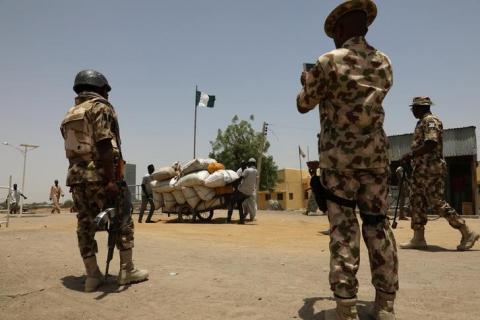Advertisement
Warned of Boko Haram, Nigerian security lapses helped schoolgirls' abduction - Amnesty
ABUJA (Reuters) - Nigerian security forces were warned about the presence of Boko Haram fighters near the town of Dapchi, but failed to respond, allowing insurgents to kidnap 110 schoolgirls almost unharrassed, Amnesty International said on Tuesday.
The kidnapping on Feb. 19 of the girls from Dapchi, aged between 11-19, had echoes of the Islamist insurgency's abduction in 2014 of 276 students from the town of Chibok, which shot Nigeria's conflict with Boko Haram, now nine years old, into the global spotlight.
It threatens to be a thorn in the side of President Muhammadu Buhari, whose 2015 electoral victory was built on criticism of his predecessor's failure to protect Nigerians, particularly in the wake of Chibok, and his promises to defeat Boko Haram.
"The Nigerian authorities have failed in their duty to protect civilians, just as they did in Chibok four years ago," said Osai Ojigho, Amnesty's Nigeria director, in Tuesday's report.
"Despite being repeatedly told that Boko Haram fighters were heading to Dapchi, it appears that the police and military did nothing to avert the abduction," she said.
A military spokesman denied that they had been warned of Boko Haram presence in the region, saying: "There was nothing like that." He said if Amnesty had important information, the watchdog should notify a presidential panel set up in the wake of Dapchi to investigate the incident.
Amnesty alleged that the Nigerian army and police received at least five phone calls warning that Boko Haram was on the way to Dapchi as early as four hours before the attack, but did not take "effective measures" to halt the militants or rescue the girls once they had been taken.
"The military withdrew troops from the area in January, meaning the closest personnel were based one hour's drive from Dapchi," the report said.
One month after the abductions, there has been little sign of the fate of the 110 schoolgirls.
Neither their parents nor Nigerian authorities have publicly acknowledged receiving any proof of life, the students have not appeared in any media issued by the kidnappers, nor has there been a public ransom demand.
"The Nigerian authorities must investigate the inexcusable security lapses that allowed this abduction to take place without any tangible attempt to prevent it," said Ojigho in the report.
Nigeria's Buhari said last week he had ordered all military and security agencies to search for them, vowing that the government would not rest until the last girl kidnapped by insurgents has been released.
Buhari has also said he plans to negotiate for their release - a sign that the military may not be able to successfully rescue them.
(Reporting by Paul Carsten; Additional reporting by Camillus Eboh; Editing by Richard Balmforth)



















Add new comment